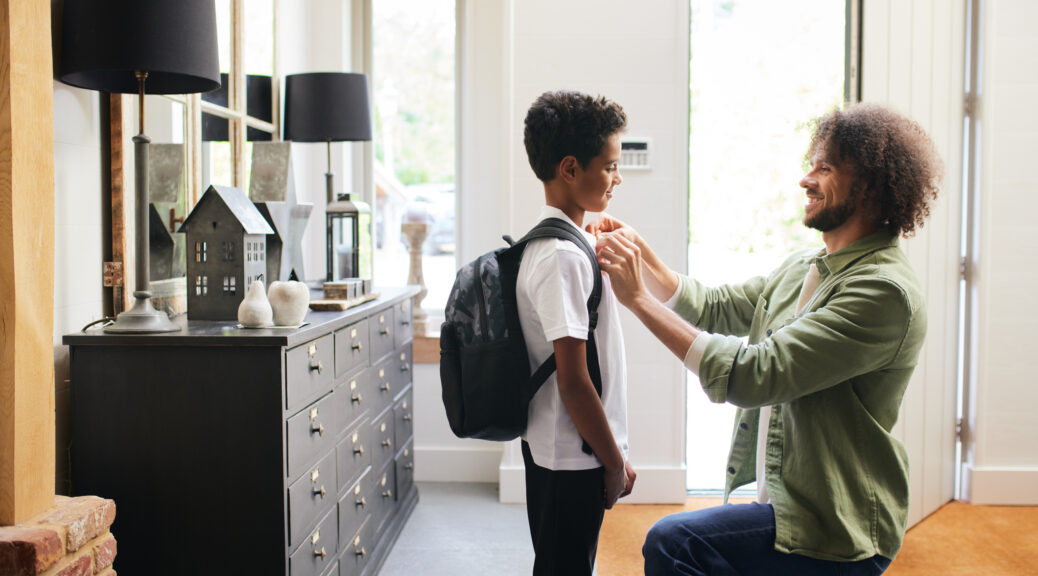How Routines Can Set Your Family Up for Success and Wellbeing

Considering how you can better navigate and strengthen your mental health? Work-life balance, self-care, connecting with loved ones and counseling or therapy are often what come to mind first. But routines are often overlooked as a useful tool to benefit mental health. Research shows that routines are the building blocks to strengthen our ability to cope with change, and build and maintain healthy habits. Routines can improve personal and professional relationships and reduce overall stress – among many other benefits!
What is a routine? At its core, a routine is a predictable order of events or behaviors that help give structure and flow to everyday activities. As a result, routines allow each day to be anchored around expected actions and interactions. This helps you participate in each routine in a meaningful way instead of dedicating time and energy to figuring out what comes next. Routines differ slightly from schedules: while a schedule is focused on events, locations and times when something starts and ends, a routine emphasizes involvement and intention.
While all of this is true for adults, it’s especially important for young people to learn, live with and co-create routines of their own. When children live in organized and predictable environments, they can learn to self-regulate. This lays a foundation for strong mental health as they grow.
Think of it this way: Remember the last time you experienced an especially busy, chaotic or unpredictable day at work? Returning home for the peacefulness of routines — like a meal, household chores and a bedtime regime — sure sounds enticing! The same goes for children and teens. The predictability of routines helps alleviate the challenges of unpredictable days outside the home.
By minimizing variables at home, children are more likely to relax into routines and embrace their predictability. Ultimately, at-home routines foster a sense of confidence and belonging, preparing children to tackle larger challenges. Let’s explore three of the most significant benefits that routines offer for mental health.
Alleviating Anxiety
Anxious thoughts thrive on the unknown. But when someone knows what to expect and has a routine they can stick with the opportunity for anxiety to thrive drops significantly. This is true even in times of tumult! The impacts of this benefit can be different for both children and caregivers.
they can stick with the opportunity for anxiety to thrive drops significantly. This is true even in times of tumult! The impacts of this benefit can be different for both children and caregivers.
For young people, routines enable them to anticipate the next activity. This allows them to mentally prepare for it and ultimately be more willing to participate. It also helps children avoid unpleasant surprises, understand what is expected of them and know when a routine is supposed to happen. This reduction in uncertainty often leads to a lower desire for arguing and minimal potential for outbursts. Because a routine has clearly defined boundaries power struggles become less likely. If you’ve ever seen a toddler throw a tantrum when they haven’t had their daily nap, or their next meal is delayed, you’ve seen the importance of routines in real life!
Meanwhile, routines help to simplify life for caregivers because consistency allows each day to run more smoothly. Caregivers won’t have to regularly change their expectations or reiterate boundaries. By reducing battles over small things – including the ever-challenging shifts from one activity to another – routines can help to reduce stress for both the caregiver and the child.
Each of these practices also helps to foster confidence and independence, especially in younger children. Once a child knows that tooth brushing happens right after waking up, they’ll naturally progress towards following these steps without needing external guidance. In this way, routines help young people build autonomy and take ownership over the daily tasks of life.
Promoting Healthier Habits
By developing at-home routines, caregivers can give young people a sense of consistency and security in their homes. This sets kids up for positive lifelong habits. Common routines include healthy habits like brushing their teeth twice each day, doing physical activity regularly and washing their hands before eating and after going to the bathroom. While these practices seem second nature to adults, they are still learned behaviors.
 Consistent daily routines can even have a positive impact on sleep schedules. When a bedtime routine is maintained, a child’s body will learn that this is one of the final steps before going to sleep. Especially when a child is under the age of ten, this establishment of a healthy body clock helps set them up for success as their teenage years begin to influence their existing body clock.
Consistent daily routines can even have a positive impact on sleep schedules. When a bedtime routine is maintained, a child’s body will learn that this is one of the final steps before going to sleep. Especially when a child is under the age of ten, this establishment of a healthy body clock helps set them up for success as their teenage years begin to influence their existing body clock.
One underlying benefit of routines is improved communication between adults and children. Both as routines are first established and once they are a consistent practice, children learn to navigate conflict. All routines should be firmly rooted in empathy and sensitivity because expectations will, eventually, be changed for a variety of reasons. For example, suppose a teen’s bedtime is 10:30 PM, but they want to see a midnight movie premiere. In that case, they may practice negotiating a different nighttime routine in order to experience a special event.
Learning to Handle Consequences
For young people, common routines include having to finish school work or household chores before they’re allowed to have screen time or play with their friends. Stacked routines – where one event can’t happen until another responsibility is finished – help children learn to navigate various consequences. This helps children learn to look forward to things, rather than expecting immediate gratification.
When it comes to consequences, it’s important to remember that young people are already going through countless emotional and physical changes that are entirely out of their control.
Similarly, at school, children will get new teachers and new classmates, all while learning new skills and building on old lessons. As a result, the ability to understand and navigate consequences is absolutely critical. The emotional rollercoaster of puberty can be made more manageable for teens if they have previous experience with the understanding that behaviors have consequences, both positive and negative.
Routines for Children in Foster Care
According to the American Academy of Pediatrics, mental and behavioral health are the largest unmet health needs for young people in foster care. Routines are crucial for all young people, and they can be particularly meaningful for children and teens in foster care. Routines can help them develop a sense of normalcy even during the ups and downs of the foster care system. 
Foster caregivers can establish routines to help the children in their care navigate challenging times when other factors are simply unknown. A routine also helps reduce decision fatigue and empowers young people to reserve their valuable mental energy for more important interactions. The ripple effects of consistent routines created by caregivers include stronger self-regulation skills and a stronger sense of stability and familiarity.
How KVC Can Help
Routines can make a transformational impact on young people! But when mental health concerns don’t improve even with the right routines, we’re here to help. Here at KVC Nebraska, we’ve been serving children, individuals and families for more than 10 years. Our services include in-home family support, behavioral healthcare, foster care, home-based support for people with disabilities, adoption and substance use treatment. Learn more about how KVC Nebraska can help.
